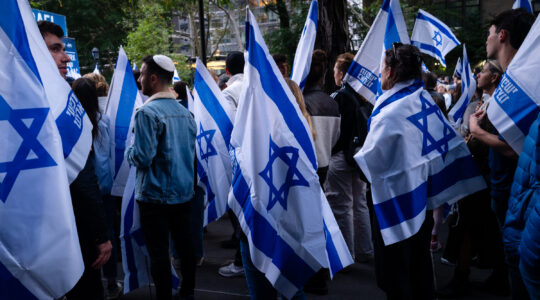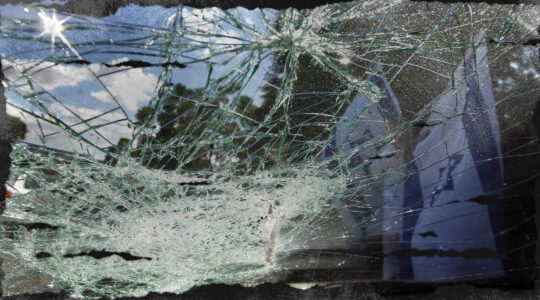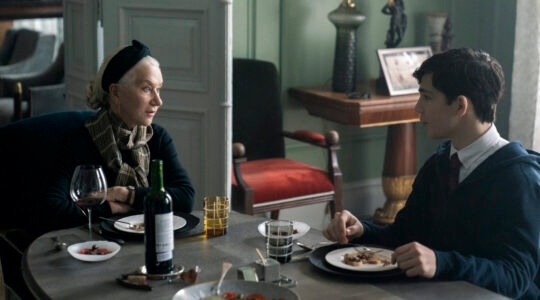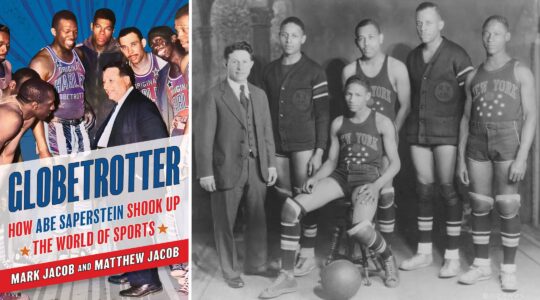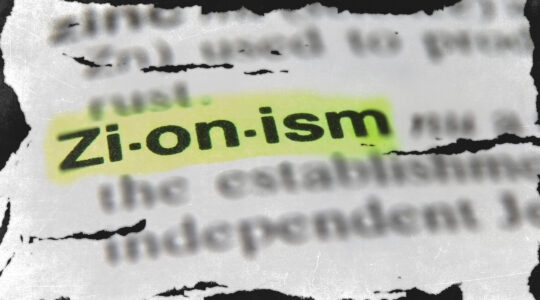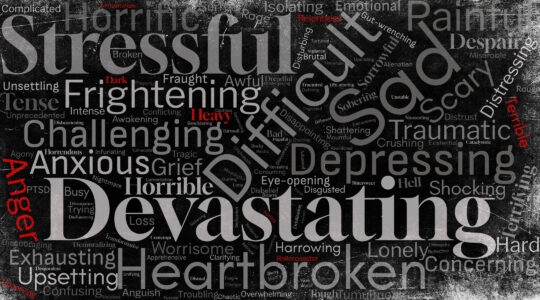Clearly, this being JTA, we don’t deal a lot with China policy.
But there’s an effort to sanitize Chas Freeman’s views about the Tiananmen Square massacre that is important – if only because it feeds into the misimpression that Israel was the only thing that had to do with his ouster as putative chairman of the National Intelligence Council. (Did this yutz actually end up preparing a single briefing before the door hit his butt? I’d like to know.)
Anyway, there are a number of components to this particular apologia, as follows:
1) Freeman’s critics have distorted his views on the massacre, casting an email he sent a private sinologist’s listserve as endorsing the massacre;
2) He was explaining how the Chinese government viewed the protests in their aftermath, and not expressing his own opinion;
3) He may be expressing a degree of sympathy with the Chinese authorities, but this is hardly unusual among sinologists.
There is some truth to this – Freeman’s views on the massacre have been misrepresented, as I explain below – but this does not clear him of fundamentally illiberal sympathies with an illiberal regime.
So:
1) Yes, Freeman’s views were distorted. Gabriel Schoenfeld, in the Wall Street Journal, did rip and re-juxtapose quotes from the original email to create the impression that, as Schoenfeld put it, Freeman "unabashedly" backed the massacre. This was a boneheaded thing for Schoenfeld to do, considering that Michael Goldfarb at the Weekly Standard was already running the entire email for all to see. Although Freeman does not (in the email) explicitly condemn the massacre, his point is that it could have been avoided had the protests been "nipped in the bud," which is very different from endorsing the massacre – and at least implicitly condemns it.
Here’s the whole email:
Sent: Friday, May 26, 2006 9:29 PM
I will leave it to others to address the main thrust of your reflection on Eric’s remarks. But I want to take issue with what I assume, perhaps incorrectly, to be yoiur citation of the conventional wisdom about the 6/4 [or Tiananmen] incident. I find the dominant view in China about this very plausible, i.e. that the truly unforgivable mistake of the Chinese authorities was the failure to intervene on a timely basis to nip the demonstrations in the bud, rather than — as would have been both wise and efficacious — to intervene with force when all other measures had failed to restore domestic tranquility to Beijing and other major urban centers in China. In this optic, the Politburo’s response to the mob scene at "Tian’anmen" stands as a monument to overly cautious behavior on the part of the leadership, not as an example of rash action.
For myself, I side on this — if not on numerous other issues — with Gen. Douglas MacArthur. I do not believe it is acceptable for any country to allow the heart of its national capital to be occupied by dissidents intent on disrupting the normal functions of government, however appealing to foreigners their propaganda may be. Such folk, whether they represent a veterans’ "Bonus Army" or a "student uprising" on behalf of "the goddess of democracy" should expect to be displaced with despatch from the ground they occupy. I cannot conceive of any American government behaving with the ill-conceived restraint that the Zhao Ziyang administration did in China, allowing students to occupy zones that are the equivalent of the Washington National Mall and Times Square, combined. while shutting down much of the Chinese government’s normal operations. I thus share the hope of the majority in China that no Chinese government will repeat the mistakes of Zhao Ziyang’s dilatory tactics of appeasement in dealing with domestic protesters in China.
I await the brickbats of those who insist on a politically correct — i.e. non Burkean conservative — view.
Chas
Here’s Schoenfeld:
On the massacre at Tiananmen Square in 1989, Mr. Freeman unabashedly sides with the Chinese government, a remarkable position for an appointee of an administration that has pledged to advance the cause of human rights. Mr. Freeman has been a participant in ChinaSec, a confidential Internet discussion group of China specialists. A copy of one of his postings was provided to me by a former member. "The truly unforgivable mistake of the Chinese authorities," he wrote there in 2006, "was the failure to intervene on a timely basis to nip the demonstrations in the bud." Moreover, "the Politburo’s response to the mob scene at ‘Tiananmen’ stands as monument to overly cautious behavior on the part of the leadership, not as an example of rash action." Indeed, continued Mr. Freeman, "I do not believe it is acceptable for any country to allow the heart of its national capital to be occupied by dissidents intent on disrupting the normal functions of government, however appealing to foreigners their propaganda may be."
Schoenfeld makes it appear as if Freeman is describing the entire handling of Tiananmen Square, including the massacre, as "overly cautious," whereas Freeman is clearly referring to events before the massacre.
2) Freeman is clearly endorsing, not simply explaining, China’s view that it was correct to suppress the protests. Presumably, his defenders are focused on his phrase, "the dominant view in China," never mind that he is saying that he finds that view "very plausible." And then there are those other troubling identifiers – "For myself," "I do not believe it is acceptable" – that make it clear these are Freeman’s views, even if he happens to share them with China’s elites. Finally, and most laughably for this sorry apology, Freeman predicts that he will hear opposing views from be "non-Burkean conservative." Not because they oppose his views but because of, you know, those massive Edmund Burke portraits you see flapping off every government building in Beijing.
3) It’s true that his views on the massacre are not unusual. I’ve noted that they seem to have been shared by the first President Bush, who notably conducted a realist foreign policy. So what. That doesn’t make them any less reprehensible. Goldfarb could be forgiven a little hyperbole when he wondered whether, with Freeman running the NIC, "the Obama administration will be giving the Chinese a free hand to deal with dissent however they see fit."
What is unusual – and what causes me to gasp every time I see it – is that he defends using the military to scatter mostly peaceful protesters in an American context. His defenders, who led the excoriation of the second Bush administration for spying on Americans, for the politicization of the military, apparently thinks this vindicates Freeman. Only Glenn Greenwald is a little qualmish about it:
It’s unclear, but I think a stray comment like that over the course of a thirty year career doesn’t undermine the credibility that someone has.
But it’s not a stray comment; it apparently goes to his core beliefs. Andrew Sullivan links (approvingly!!!) to another email in the exchange, and once again, there’s that MacArthur reference:
The only surprise to me (and other realists, including, I gather, you) was that the Chinese leadership did not act earlier to restore order. We would have done so, judging by the precedents set by MacArthur and our National Guard over the decades from 1920 – 1950. The main lesson those leaders who survived the affair have drawn from it, in fact, is that one should strike hard and strike fast rather than tolerate escalating self-expression by exuberantly rebellious kids. If June 4 tells us anything about the Chinese leadership it is that they are reluctant, often to the point of rashness, to resort to the use of force against their fellow citizens.
Freeman is referring to one of the most notorious episodes in Douglas MacArthur’s career, when as military chief of staff in 1932 he ordered troops to disperse the "Bonus Army," tens of thousands of former conscripts who were seeking to redeem desperately needed bonuses before maturation.
MacArthur’s rationale, according to this sympathetic biography, was that the men had been infiltrated by Communists, although that was clearly not the case. (And even if it was…?) Not long before the incident, MacArthur had described pacifism as "undermining the morals of the working man" and as a "canker" that eats "deeper into the body politic." And incidentally, MacArthur used regular army troops to break up the protests not, as Freeman suggests, the National Guard.
So this is what I want to know from Freeman’s defenders: Were you truly comfortable with a top intel official who repeatedly upholds as sound policy the removal by force of mostly peaceful protesters through domestic deployment of the military, backed by tanks and led by a general who dissembles a Commie scare? And who belittles – or at least ignores – how such protests advanced the civil rights we now hold dear? (I wonder what Freeman made of Kent State.)
Editing the daily intelligence briefing?
Really?

Help ensure Jewish news remains accessible to all. Your donation to the Jewish Telegraphic Agency powers the trusted journalism that has connected Jewish communities worldwide for more than 100 years. With your help, JTA can continue to deliver vital news and insights. Donate today.
